Badi Soch: Rouhani the moderate?
This daily column includes Gateway House’s Badi Soch – big thought – of the day’s foreign policy events. Today’s focus is on Iranian President Hassan Rouhani’s claims of being a moderate and pragmatic figure
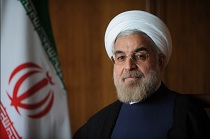 Courtesy: Iranian presidential website/ Wikimedia Commons
Courtesy: Iranian presidential website/ Wikimedia Commons
This daily column includes Gateway House’s Badi Soch – big thought – of the day’s foreign policy events. Today’s focus is on Iranian President Hassan Rouhani’s claims of being a moderate and pragmatic figure
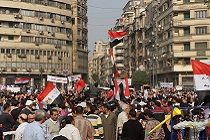 Courtesy: Zeinab Mohamed/Flickr
Courtesy: Zeinab Mohamed/Flickr
Today, the role Wahabbism plays in geopolitics poses a severe security risk not just to the West but also to the Muslim world. The West needs to rethink its strategy of promoting Wahabbi International, and realise that Wahabbism cannot be a moderated geopolitical asset
 Courtesy: oxfamnovib/Flickr
Courtesy: oxfamnovib/Flickr
Elections are meant to be a suitable recourse in democracies if citizens feel that the government does not represent them. However, the recent protests in Brazil, Turkey and India show that people feel political classes are too far removed from their every day realities to address their grievances
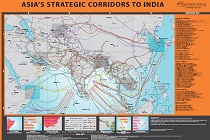 Courtesy: Gateway House
Courtesy: Gateway House
The map – Asia’s Strategic Corridors to India – has emerged from Gateway House’s study of India’s strategic links with other parts of Asia. It highlights the progress India has made in forging multiple links with six strategic regions – Central Asia, West Asia, East Africa, South-East Asia, East Asia, and our immediate neighbourhood
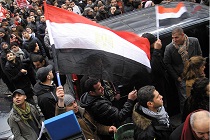 Courtesy: Jacques Delarue/Wikimedia Commons
Courtesy: Jacques Delarue/Wikimedia Commons
The leaderless protests are upending traditional definitions of leadership and forms of hierarchy. Instead, the protestors are seeking some form of direct democracy and dignity.
 Courtesy: European External Action Service/ Flickr
Courtesy: European External Action Service/ Flickr
The downfall of Egyptian president Mohammad Morsi was partly contributed by those thousands of protesters who disagreed with his view of “Us” and “Them”. Leaders such as Morsi have focused on persecuting those who refuse to share their vision; continuing down this path would have had a negative impact on history
 Courtesy: Semilla Luz/ Flickr
Courtesy: Semilla Luz/ Flickr
The protests in Brazil, Turkey, Egypt and India are bound by a common thread of grievances against misuse of government power and corruption. These modern protests show a marked decline in government trust, even though may not always have clear objectives
 Courtesy: MEAphotogallery/ Flickr
Courtesy: MEAphotogallery/ Flickr
In 2012, Iraq emerged as India’s second largest crude oil supplier thereby shifting focus back on bilateral relations. However, India’s historical and cultural connection with Iraq, as well as common geopolitical concerns, reveal that relations have the potential to go beyond oil
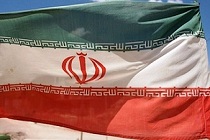 Courtesy: openDemocracy/Flickr
Courtesy: openDemocracy/Flickr
Hassan Rohani’s victory in the June 14 presidential election has demonstrated a growing urge among Iranians for democracy, freedom and integration with the outside world. Will Rohani be able to create an environment where pragmatic policies and national interests take precedence over revolutionary zeal?
 Courtesy: Center for American Progress Action Fund/Flickr
Courtesy: Center for American Progress Action Fund/Flickr
The U.S. Secretary of State’s visit to India comes at a time when India is witnessing significant realignments in its domestic politics while the U.S. is busy tackling its cyber-spying allegations. Amidst these preoccupations, will the upcoming India-U.S. talks churn out substantive outcomes?